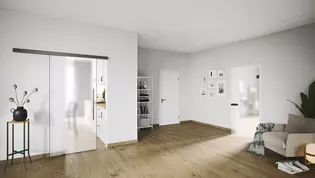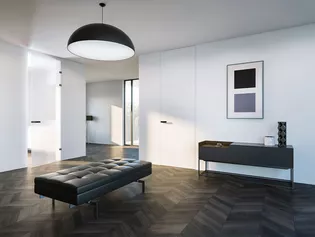All about doors: The ultimate door guide
Welcome to the big ABC of doors! Here you can find out what doors there are, what purpose doors serve and what they can be made of. So that you know afterwards what the right door is for you.
Builders, owners and tenants alike like to think about floors and wall colours. But doors? They often get too little attention. Yet they are so important: they protect our flat or house; they prevent noise or smells - and in some cases they even prevent misfortune and serious fires. Let's take a look at the types of doors.
What are the doors - and what do you need them for?
Which door you need depends first of all on the place of application: is it an interior or exterior door? Front doors should above all be solid and stable, so that they offer us protection, for example, from burglars. The same applies to apartment doors in an apartment building. Here, pay particular attention to the standards for resistance class (RC) against burglary, differential climate behavior against problems with strong temperature differences, and sound insulation.
Similar issues apply to balcony and patio doors, i.e. sound insulation and, if necessary, burglar resistance. However, unlike front doors, they are usually made entirely of glass and are therefore much more sensitive in terms of temperature permeability.
In the house itself, it is then mostly a question of room doors on the one hand and partition doors to functional rooms such as the garage, cellar or attic. With the often massive partition doors, fire protection issues are most important. Here, too, the following applies: Above all, pay attention to DIN standards and to the fact that they can be opened easily from the inside in an emergency in order to keep escape routes open.

Room doors are primarily a question of appearance: Do I want to use doors to set accents in the room? Does the room possibly need light from outside? How large is the room? Do I want to avoid drafts or unpleasant odors, if necessary? Doors are also important inside a house to prevent noise - anyone with children knows why.
What material should my door be made of?
In principle, doors can be made of four materials: Wood together with related materials such as high-quality pressboard, plastic, glass and metal.
Wooden doors are the classic, especially for interiors. While solid wood doors carry a certain weight, there are now a wide variety of wood-based materials from which doors can be made. The advantage of wood is that it is a warm material that beautifies any room and can be made into almost any shape or color. In addition, wood insulates well - and allows a certain degree of privacy.
Doors made of glass or those that bring with them a larger light cutout enlarge the space, make it brighter - and in the process, depending on their nature, can even insulate as well as wooden doors. Glass doors are ideal for interiors where many people gather, as well as balcony and patio doors or dark rooms that need light from the outside. Unusual looks are now possible with glass, which can be used to create great design accents: Thanks to engraving, matting and Co. But beware: As interior doors, they protect less against temperature differences between hallway and room.
Plastic is also well suited for doors - especially at the entrance to the house. This is because the lightweight material is weather-resistant and easy to maintain. If the doors are made of high-quality plastic, they offer excellent protection against burglary.
Doors made of metal, on the other hand, are optimal for fire protection as well as for front doors. They keep burglars out and also withstand high temperatures in the event of a fire. Of course, they are often massive and therefore comparatively heavy - which does not fit everywhere.

Doors technology: what are the types of doors?
What most people think of as a door are so-called swing doors - also called revolving doors. They hang on two hinges, which is usually attached to the wall with a door frame. They open into the room and turn against the wall. If you like it more stately and have enough space, double doors are an option. Especially between two living rooms, they will impress guests and create an element that exudes generosity.
A clever alternative for smaller rooms such as guest WC, pantry, walk-in closet or home office area are sliding doors. Their advantage is the fact that they are very space-saving - and in some cases can even be recessed into the wall.
The same applies to folding doors: they save space and are practical. Modern folding doors also have nothing to do with the old-fashioned folding doors from the mid-20th century that are still installed in many a multi-purpose hall today.